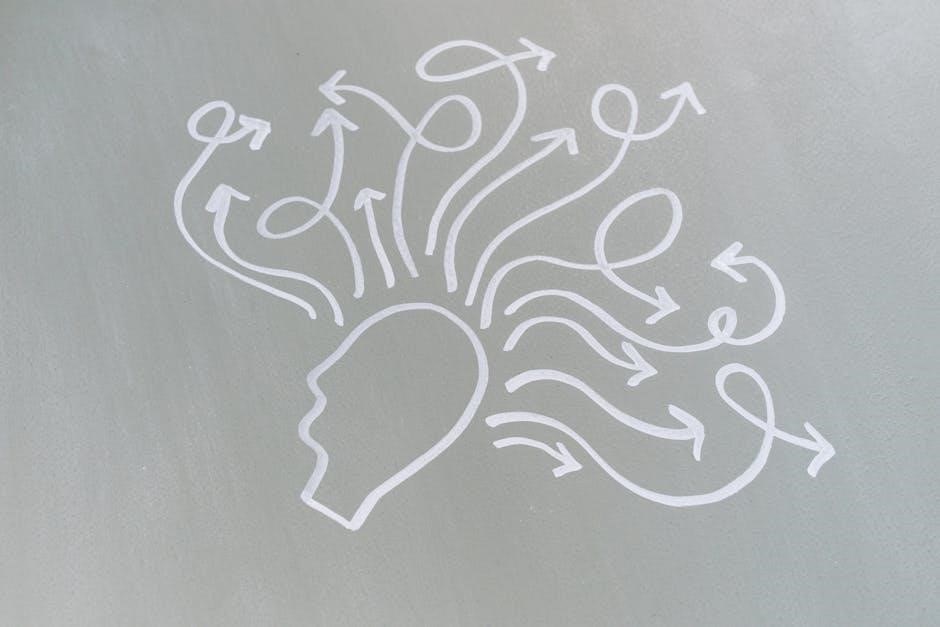The Myers AP Psychology textbook by David G. Myers is a widely used resource for Advanced Placement Psychology courses‚ known for its comprehensive coverage and engaging content.
Recent debates‚ such as those in Williamson County‚ highlight its relevance in education‚ while the availability of a PDF version ensures accessibility for digital learners.
1.1 Overview of the Textbook
The Myers AP Psychology textbook‚ authored by David G. Myers‚ is a comprehensive resource designed for Advanced Placement Psychology courses. It covers a wide range of topics‚ from foundational concepts to advanced theories‚ aligning closely with the AP Psychology curriculum. The textbook is known for its engaging writing style‚ inclusion of real-world applications‚ and integration of visual aids like diagrams and charts to enhance understanding. Additionally‚ it offers practice questions and assessments to help students prepare for exams. A PDF version of the textbook is widely available‚ making it accessible for digital learners. Recent debates‚ such as those in Williamson County‚ highlight its relevance in modern education‚ though some districts like Selinsgrove have approved its use despite initial concerns.
1.2 Importance of the Textbook in AP Psychology Education
The Myers AP Psychology textbook plays a crucial role in shaping students’ understanding of psychological concepts. Its alignment with the AP Psychology curriculum ensures comprehensive preparation for exams. The textbook’s engaging content‚ real-world examples‚ and study resources like practice questions make it an essential tool for both teachers and students. Debates in districts like Williamson County highlight its significance‚ as it sparks discussions on psychological theories and their relevance in modern education. The availability of a PDF version further enhances accessibility‚ making it a cornerstone for AP Psychology education nationwide.

Key Features of the Myers Psychology for AP Textbook
The Myers Psychology for AP textbook offers comprehensive coverage of the AP Psychology curriculum‚ with engaging learning tools and updated research; Its digital PDF version enhances accessibility.

2.1 Comprehensive Coverage of AP Psychology Curriculum
The Myers Psychology for AP textbook is renowned for its thorough alignment with the AP Psychology course framework‚ ensuring students master all essential topics.
From scientific foundations to biological psychology‚ cognition‚ and social psychology‚ the textbook provides detailed explanations and real-world applications of key concepts.
Updated research and theories are seamlessly integrated‚ preparing students for both the AP exam and a deeper understanding of psychological principles.
2.2 Engaging Learning Tools and Resources
The Myers Psychology for AP textbook offers a variety of engaging learning tools designed to enhance student interaction and understanding. Features like concept maps‚ interactive activities‚ and online labs provide hands-on experiences that make complex psychological concepts more accessible. The textbook also includes review questions‚ quizzes‚ and critical thinking exercises to reinforce learning. These resources help students apply theoretical knowledge to real-world scenarios‚ fostering a deeper engagement with the material.
2.3 Updated Research and Theories in Psychology
The Myers Psychology for AP textbook is renowned for its integration of the latest research and theories in psychology. Each edition incorporates recent studies‚ ensuring students access cutting-edge knowledge. Topics such as cognitive psychology‚ neuroscience‚ and social psychology are updated to reflect advancements in the field. The textbook also addresses emerging areas like the impact of technology on behavior and mental health. By staying current‚ the Myers textbook prepares students for the AP exam while fostering a deeper understanding of psychology’s evolving nature and its practical applications in today’s world.

Content Organization in the Myers Textbook
The Myers textbook is logically structured‚ with clear chapter divisions and engaging layouts. Visual elements and practice questions are seamlessly integrated to enhance comprehension and application of psychological concepts effectively.
3.1 Structure of the Chapters
The Myers textbook organizes content into clear‚ logically structured chapters. Each chapter begins with learning objectives‚ followed by detailed explanations of key concepts and theories. Subheadings and bullet points break down complex ideas into digestible sections. Real-world examples and case studies are woven throughout to illustrate psychological principles. Chapters conclude with review materials‚ including summaries and practice questions‚ to reinforce learning. This systematic approach ensures students can follow the material sequentially‚ building a strong foundation for understanding AP Psychology concepts effectively.
3.2 Integration of Visual Aids and Diagrams
The Myers textbook enhances learning through the strategic use of visual aids and diagrams. Detailed illustrations‚ charts‚ and graphs simplify complex psychological concepts‚ such as brain structures and cognitive processes. Infographics and flowcharts help students visualize relationships between theories and research findings. Diagrams are often paired with explanatory captions‚ making abstract ideas more tangible. These visual elements are carefully integrated to complement the text‚ ensuring that students can grasp and retain information more effectively. The combination of visual and textual content creates an engaging and interactive learning experience.
3.3 Practice Questions and Assessments
The Myers textbook includes a wide range of practice questions and assessments to reinforce learning. Each chapter features multiple-choice questions‚ free-response prompts‚ and self-tests that mirror the AP Psychology exam format. These exercises help students identify areas for improvement and build confidence. Additionally‚ review questions at the end of each chapter provide a comprehensive check of understanding. The textbook also offers detailed explanations for correct and incorrect answers‚ enabling students to refine their knowledge and critical thinking skills. Regular assessments ensure students are well-prepared for the AP exam and long-term retention of key concepts;

The Role of David G. Myers in AP Psychology
David G. Myers is a renowned psychology author and educator‚ widely recognized for creating engaging‚ research-based textbooks. His work aligns with AP Psychology curriculum standards‚ fostering deep understanding and critical thinking skills among students‚ making him a cornerstone in psychology education.
4.1 Biography of David G. Myers
David G. Myers is a distinguished psychologist‚ author‚ and educator‚ known for his contributions to psychology education. Born in 1943‚ Myers earned his Ph.D. in psychology from the University of Iowa. He has taught at institutions like Hope College and has authored numerous bestselling textbooks‚ including Psychology and Exploring Psychology. His work emphasizes critical thinking‚ scientific literacy‚ and real-world applications of psychology. Myers has received awards for his teaching and writing‚ solidifying his reputation as a leader in psychology education. His textbooks‚ including the AP Psychology edition‚ are widely acclaimed for their clarity and engagement.
4.2 His Contributions to Psychology Education
David G. Myers has profoundly shaped psychology education through his engaging and comprehensive textbooks. His works‚ including the AP Psychology textbook‚ are renowned for their clarity and depth‚ covering the entire curriculum while fostering critical thinking. Myers has introduced innovative teaching strategies and learning tools‚ making complex concepts accessible. His resources support diverse learning styles and provide digital accessibility‚ enhancing education for both students and educators. By adapting to modern learning needs‚ Myers continues to influence the future of psychology education‚ ensuring his textbooks remain essential tools for understanding the field.
4.3 Teaching Strategies in the Textbook
David G. Myers’ textbook incorporates effective teaching strategies to enhance student engagement and understanding. It features chapter outlines‚ concept reviews‚ and practice questions that align with the AP Psychology curriculum. The text emphasizes critical thinking through reflective exercises and real-world applications‚ encouraging students to connect psychological theories to everyday life. Myers also integrates visual aids and digital resources to accommodate diverse learning styles. These strategies promote active learning‚ making the textbook a valuable resource for both teachers and students aiming to master AP Psychology concepts effectively.

Controversies Surrounding the Myers Textbook
The Myers textbook has sparked debates among educators and school boards‚ with some questioning its content and others defending its academic value and relevance to AP Psychology.
5.1 Debates in Williamson County School Board
The Williamson County School Board faced controversy over the Myers textbook‚ with concerns raised by parents and board members about certain content. Critics argued that some sections promoted liberal ideologies and lacked balanced perspectives. The debate intensified when the board considered removing the textbook from the curriculum. Supporters emphasized its alignment with AP Psychology standards and its academic rigor. The board ultimately decided to retain the textbook but with additional oversight. This incident highlights the challenges of balancing educational content with community values and political sensitivities in public education systems.
5.2 Concerns About Content and Bias
Critics have raised concerns about potential bias in the Myers textbook‚ particularly regarding its presentation of controversial topics. Some argue that certain chapters emphasize progressive perspectives‚ which may not reflect diverse viewpoints. Additionally‚ concerns have been voiced about the textbook’s handling of sensitive issues‚ such as gender roles and intelligence testing. These criticisms suggest that while the book excels in breadth‚ its depth in addressing opposing viewpoints could be improved. Educators and publishers have responded by emphasizing the importance of critical analysis and encouraging students to evaluate sources independently.
5.3 Responses from the Publisher and Educators
The publisher has acknowledged concerns about content bias‚ stating a commitment to inclusivity and accuracy. Educators have largely defended the textbook‚ praising its comprehensive approach and emphasis on evidence-based psychology. Many teachers use the book as a framework while supplementing with additional materials to foster balanced discussions. The publisher has also expressed openness to feedback‚ ensuring future editions reflect diverse perspectives. Overall‚ the textbook remains widely adopted‚ with educators highlighting its value in preparing students for the AP exam while encouraging critical thinking and nuanced understanding of complex topics.

Digital Access to the Myers Textbook
The Myers AP Psychology textbook is available in digital formats‚ including PDF‚ accessible via online platforms. This allows students to study conveniently on various devices.
6.1 Availability of the PDF Version
The Myers AP Psychology textbook is widely available in PDF format‚ accessible through various online platforms and educational resources. Students can download or view the PDF‚ enabling easy access to the textbook’s content. This format is particularly useful for digital learners‚ as it allows highlighting‚ note-taking‚ and full-text search capabilities. Many schools and educators provide links to the PDF version‚ ensuring accessibility for those who prefer or require digital learning materials. The PDF version maintains the same comprehensive content as the physical book‚ making it a convenient option for studying and reviewing course material.
6.2 Benefits of Digital Learning Resources
Digital learning resources‚ such as the Myers AP Psychology textbook PDF‚ offer numerous benefits for students. They provide anytime‚ anywhere access‚ enabling flexible learning schedules and remote study. Interactive features like multimedia‚ quizzes‚ and hyperlinks enhance engagement and understanding. Digital tools also promote organization‚ as students can easily search‚ highlight‚ and annotate content. Additionally‚ digital resources reduce the need for physical materials‚ making them environmentally friendly and cost-effective. Regular updates ensure students access the most current information‚ aligning with evolving AP Psychology standards and fostering a dynamic learning experience tailored to modern educational needs.
6.3 Challenges of Online Access
While digital access offers convenience‚ it also presents challenges. Internet connectivity issues can hinder access‚ particularly in areas with unreliable service. Additionally‚ not all students may have compatible devices‚ creating disparities in learning. Some learners prefer physical textbooks‚ finding digital formats less engaging or more straining to read. Furthermore‚ distractions from notifications and multitasking can reduce focus. Accessibility concerns‚ such as limited support for assistive technologies‚ may also arise. These challenges highlight the need for balanced solutions that address both the benefits and limitations of online learning resources for AP Psychology students.

Relevance of the Myers Textbook in Modern Education
The Myers textbook remains highly relevant‚ offering a clear‚ evidence-based approach aligned with modern educational standards and the evolving AP Psychology curriculum framework.
7.1 Alignment with AP Psychology Course Framework
The Myers textbook aligns closely with the AP Psychology course framework‚ ensuring comprehensive coverage of all required units and topics. Each chapter is structured to match the College Board’s curriculum‚ providing a clear and organized learning path. The textbook includes unit reviews‚ practice questions‚ and concept applications that reinforce key concepts and skills outlined in the framework. This alignment ensures students are well-prepared for the AP exam‚ making it an essential resource for achieving success in the course.
7.2 Student Feedback and Reviews
Students and educators praise the Myers textbook for its clarity and engaging presentation of complex concepts. Many appreciate the relatable examples and interactive features that enhance understanding. The PDF version is particularly popular for its convenience and accessibility. However‚ some students find the text dense and suggest it requires prior knowledge to fully grasp certain topics. Overall‚ the textbook is highly regarded for its thoroughness and alignment with the AP Psychology curriculum‚ making it a valuable study resource for students preparing for the exam.
7.3 Comparison with Other Psychology Textbooks
The Myers textbook stands out for its comprehensive coverage and engaging style‚ often surpassing competitors like Coon/Mitterer or Cervone. While other textbooks may offer similar content‚ Myers excels in clarity and real-world applications. Its detailed visuals and practice questions are particularly praised compared to alternatives. However‚ some find it denser thantexts like Cervone. Overall‚ Myers remains a top choice for AP Psychology‚ balancing depth and accessibility better than many rivals‚ making it a preferred resource for both students and educators in the field.

Teaching Strategies Supported by the Textbook
The Myers textbook supports active learning through interactive exercises‚ critical thinking prompts‚ and diverse teaching methods‚ fostering deeper engagement and understanding of psychological concepts for all learners.
8.1 Active Learning Techniques
The Myers AP Psychology textbook integrates active learning techniques to foster engagement and retention. Interactive exercises‚ such as think-pair-share activities and in-class debates‚ encourage students to apply psychological concepts. The textbook also incorporates hands-on labs and real-world scenarios‚ enabling learners to explore complex theories through practical application. These strategies promote collaborative learning‚ critical analysis‚ and problem-solving skills. By encouraging participation and reflection‚ the textbook helps students develop a deeper understanding of psychology‚ making it an effective tool for modern educators aiming to create dynamic and inclusive classrooms.
8.2 Encouraging Critical Thinking
The Myers AP Psychology textbook emphasizes critical thinking through thought-provoking questions and case studies. It encourages students to analyze psychological theories‚ evaluate research methods‚ and apply concepts to real-world scenarios. Interactive exercises and reflective prompts invite learners to question assumptions and consider multiple perspectives. By fostering an inquiring mindset‚ the textbook helps students develop the ability to evaluate evidence‚ identify biases‚ and form well-supported conclusions. These strategies prepare students for the AP exam and beyond‚ equipping them with essential skills for academic and professional success in psychology and related fields.
8.3 Supporting Diverse Learning Styles
The Myers AP Psychology textbook caters to diverse learning styles by incorporating a variety of tools and resources. Visual learners benefit from diagrams‚ charts‚ and images‚ while kinetic learners engage with hands-on activities and experiments. The textbook also includes online resources‚ such as videos and interactive modules‚ to accommodate different preferences. Additionally‚ the inclusion of summaries‚ concept maps‚ and practice quizzes helps auditory and tactile learners grasp complex concepts. This multifaceted approach ensures that all students‚ regardless of their learning style‚ can effectively engage with the material and achieve academic success.

Future of the Myers Textbook in AP Psychology
The Myers textbook will likely see regular updates‚ incorporating the latest research and enhanced digital features‚ ensuring it remains a leading resource in AP Psychology education.
9.1 Expected Updates and Revisions
The Myers textbook is expected to undergo periodic revisions to incorporate the latest psychological research and educational standards. Future editions may include expanded coverage of emerging topics like cognitive neuroscience and behavioral economics. The PDF version will likely be updated to reflect these changes‚ ensuring students have access to the most current information. Additionally‚ revisions may address feedback from educators and students‚ enhancing clarity and engagement. These updates will aim to align the textbook more closely with the College Board’s AP Psychology course framework‚ maintaining its status as a premier educational resource.
9.2 Growing Popularity of Digital Formats
The Myers AP Psychology textbook in PDF format is gaining popularity due to its convenience and accessibility. Digital versions allow students to access materials anytime‚ anywhere‚ across multiple devices. Enhanced search functionality and portability make studying more efficient. Additionally‚ digital formats align with modern learning preferences‚ reducing the need for physical books. The demand for e-resources is rising‚ especially among tech-savvy students. This shift supports environmental sustainability and reflects the broader trend toward digital education. As technology advances‚ digital textbooks like the Myers PDF are becoming indispensable for AP Psychology students.
9.3 Potential Impact on AP Psychology Education
The Myers AP Psychology textbook in PDF format could significantly shape the future of AP Psychology education. By offering accessible‚ up-to-date content‚ it ensures students are well-prepared for exams and beyond. The digital version supports diverse learning styles‚ aligns with modern educational trends‚ and fosters engagement through interactive features; Its widespread adoption could raise educational standards‚ promoting deeper understanding of psychology concepts. Additionally‚ it encourages environmental sustainability by reducing reliance on physical books. This shift underscores the importance of adapting teaching materials to meet the needs of a digital-first generation‚ ensuring psychology education remains relevant and effective.
